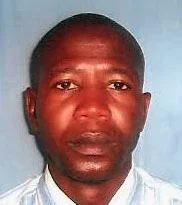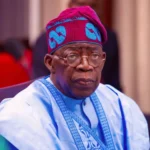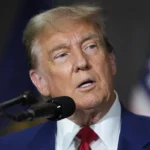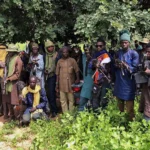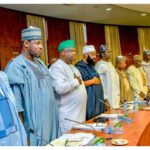Musing With Afolabi Gambari Emailafolabigambari@urbanexpresslive Phone 08064651922
“Nothing is beyond happening in Nigeria,” revered columnist, Professor Olatunji Dare, famously declared in one of his “Diary of a debacle” series which he started shortly after the June 12 1993 presidential election. Dare had wondered how and why an election that bore all the signs of success that could usher in a greater country was willfully scuttled by the very people who spent close to eight years dispensing enormous funds and human resources aimed at making the election a success. Up to this day, it has not yet been ascertained exactly why a country’s dream was turned to a nightmare that still afflicts the country. But rather than ask to know the “how” and “why” that Dare wondered about in 1993, the country has carried on like there should never be any reason to ever do so.
The Hunger protest of August 1 2024 had revealed some hidden things about what has become of Nigeria as a country since the incumbent President Bola Tinubu mounted the saddle on May 29 2023, namely that the mass of the people were hungry and justifiably angry, leading them to so much frustration. It was only natural that anything must give; and it did give. The destruction that accompanied the protest was enough for the government to re-think its anti-social policies that had led many to think morbidly. But, more than that, the involvement of so many children in the protest should have sent a red alert to the government when kids that should be attracted by school had been attracted by violence.
In no time, the protest was quelled, but not until scores of the protesters were rounded up and detained in unknown centers. Not that the identity of those arrested as well as the fate that befell them should not have been known, at any rate. But the flurry of activities afterwards, which dovetailed to the quest for basic survival for many, must have imposed amnesia on the lot, such that a tiny few would have bothered who was picked up or released or kept in detention and for how long. This doubtless resulted in the alarm raised on November 1 after about 76 minors were arraigned before a judge at the Federal High Court in Abuja, charged with ten counts of terrorism, an attempt to overthrow the government, and alleged mutiny over their action in the August protest. If the Federal Government did not immediately express any feeling of embarrassment at the absurd occurrence in the courtroom, reactions from around the world had jolted it to realise that the barbaric nature of Nigeria was for the umpteenth time being announced to the world.
Yet, it was the Nigeria Police Force Public Relations Officer, Muyiwa Adejobi, that first defended the state action against the minors who were soon after understood to have been in detention since their arrest in August. Adejobi told journalists, perhaps for the record: “Children above the age of seven can be charged to court.” For greater effect, he also said: “The fact that someone is 13 does not mean he or she cannot be charged to court. Even under the Children and Young Persons Act, individuals can still be charged. We have charged them on behalf of the Federal Government.” In the defence of the absurdity, Adejobi had roped in the Federal Government.
But Adejobi was not done. In a fit of inexplicable anger, he said: “These are individuals who leveraged the #EndBadGovernance protest, hijacked it, became violent and displayed flags of Russia and other countries which is, of course, an offence. They are criminally liable.” Six of the minors fainted in the court, apparently due to exhaustion. But the police publicist promptly dismissed the action as “drawing media attention in a deliberate and scripted manner to draw negative attention”, although he also confirmed that medical aid was provided for them “in demonstration of the Police Force’s commitment to the welfare of those in its custody, irrespective of the allegations they face”.
When the Federal Government’s Counsel, Rimazonte Ezekiel, claimed that some of the 76 minors were adults, saying “some have wives who appeared in court with their parents”, it did appear that, at long last, that the scapegoats of the hunger protest were finally in the government net.
Adejobi had said that the Police Force acted on the minors on behalf of the Federal Government, aforementioned. But by November 4, the same Federal Government had denied involvement in the minors’ ordeal, as Mr. President directed the Attorney-General of the Federation to “ensure the immediate release of the minors detained by the Nigeria Police in connection to last August’s protest without prejudice to any ongoing legal processes”. Minister of Information and National Orientation, Mohammed Idris, who announced the president’s directive to journalists at the Aso Villa, said his principal “emphasised the importance of balancing legal processes with humanitarian concerns”.
Short of saying the security agencies were liable for the gross national embarrassment, Idris said: “The President has mandated an investigation into the actions of all law enforcement agents and officials involved in the minors’ arrest and legal processing, promising appropriate disciplinary measures against cases of misconduct uncovered.”
Following the president’s special interest in the case, the Attorney-General of the Federation, Lateef Fagbemi (SAN), directed the Inspector General of Police to transfer the case file to his office’s Director of Public Prosecution of the Federation in what seemed not only a classic buck-passing but also a lack of synergy between the police hierarchy and the attorney-general.
The Civil Society Organisations found an ample chance to pounce. The Executive Director of the Rule of Law Advocacy and Accountability Centre, Okechukwu Nwaguma said: “Arresting the minors is an abomination and keeping them in custody for nearly three months in harsh conditions, alongside adults, is an even greater abomination.” The Executive Director of the Centre for Anti-Corruption and Open Leadership, Debo Adeniran, echoed Nwaguma: “The release of the minors is a belated decision that ought to have happened when they were arrested and the Ministry of Justice should have advised the president appropriately on why minors should not be subjected to such a harrowing experience under detention.”
By Tuesday, November 5, Vice President Kashim Shettima said: “The president and commander in chief of the armed forces of the Federal Republic of Nigeria, Bola Ahmed Tinubu, instructed the release of the suspects on humanitarian grounds. As the father of the nation, he decided to give these young men another chance at becoming responsible citizens who will make a positive impact in a drive for a better Nigeria.” He then handed over the minors to Kano State Governor, Abba Yusuf, who took all of them back to Kano, from where they had been arrested in August, in a special flight arranged by the Federal Government.
There ended one comedy, as the nation awaited yet another.

